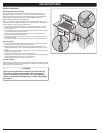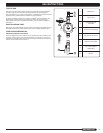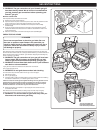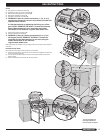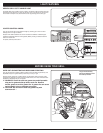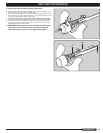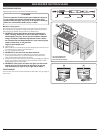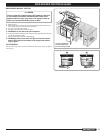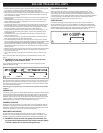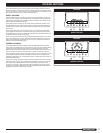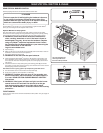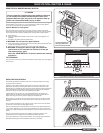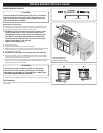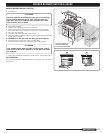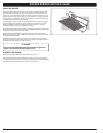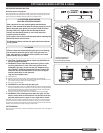Special offers from our partners!

Find Replacement BBQ Parts for 20,308 Models. Repair your BBQ today.

Buy Weber Grill Parts. It couldn't be easier. Find your Weber parts here.

16
GRILLING TIPS & HELPFUL HINTS
Note: The temperature inside your cookbox for the first few uses, while surfaces are still
very reflective, may be hotter than those shown in your cookbook. Cooking conditions,
such as wind and weather, may require the adjustment of the burner controls to obtain
the correct cooking temperatures.
If burners go out during cooking, turn off all burners and wait five minutes before
relighting.
◆
PREHEATING
Your Weber
®
gas barbecue is an energy-efficient appliance. It operates at an economical
low BTU rate. Preheating the grill before grilling is important. Light your grill according
to the instructions in this Owner’s Manual. To preheat: after lighting turn all burners to
START/HI, close the lid, and heat until the temperature reaches between 500° and 550°
F (260° and 290° C), the recommended broiling temperature. This will take 10 to 15
minutes depending on conditions such as air temperature and wind.
◆
COVERED COOKING
All grilling is done with the lid down to provide uniform, evenly circulated heat. With the
lid closed, the gas grill cooks much like a convection oven. The thermometer in the lid
indicates the cooking temperature inside the grill. All preheating and grilling is done with
the lid down. No peeking — heat is lost every time you lift the lid.
◆
DRIPPINGS AND GREASE
The Flavorizer
®
bars are designed to “smoke” the correct amount of drippings for
flavorful cooking. Excess drippings and grease will accumulate in the catch pan under
the slide out grease tray. Disposable foil drip pans are available that fit the catch pan.
m WARNING: Check the slide out grease tray and catch pan
for grease build-up before each use. Remove excess grease
to avoid a grease fire in the slide out grease tray.
◆
• Always preheat the grill before cooking. Set all burners on HI heat and close lid; heat
for 10 minutes, or until thermometer registers 500°-550° F (260°-288°C).
• Sear meats and cook with the lid down for perfectly grilled food every time.
• Grilling times in recipes are based on 70°F (20°C) weather and little or no wind. Allow
more cooking time on cold or windy days, or at higher altitudes. Allow less cooking
time in extremely hot weather.
• Grilling times can vary because of the weather, or the amount, size and shape of the
food being grilled.
• The temperature of your gas grill may run hotter than normal for the first few uses.
• Grilling conditions may require the adjustment of the burner controls to attain the
correct cooking temperatures.
• In general, large pieces of meat will require more cooking time per pound than small
pieces of meat. Foods on a crowded cooking grate will require more cooking time
than just a few foods. Foods grilled in containers, such as baked beans, will require
more time if grilled in a deep casserole rather than a shallow baking pan.
• Trim excess fat from steaks, chops and roasts, leaving no more than a scant ¼ inch
(6.4mm) of fat. Less fat makes cleanup easier, and is a virtual guarantee against
unwanted flare-ups.
• Foods placed on the cooking grate directly above burners may require turning or
moving to a less hot area.
• Use tongs rather than a fork for turning and handling meats to avoid losing natural
juices. Use two spatulas for handling large whole fish.
• If an unwanted flare-up should occur, turn all burners off and move food to another
area of the cooking grate. Any flames will quickly subside. After flames subside, relight
the grill. NEVER USE WATER TO EXTINGUISH FLAMES ON A GAS GRILL.
• Some foods, such as a casserole or thin fish fillets, will require a container for grilling.
Disposable foil pans are very convenient, but any metal pan with ovenproof handles
can also be used.
• Always be sure the slide out grease tray and catch pan are clean and free from debris.
• Do not line the slide out grease tray with foil. This could prevent the grease from
flowing into the catch pan.
• Using a timer will help to alert you when “well-done” is about to become “over-
done.”
Note: If grill looses heat while cooking refer to the troubleshooting section of this
manual.
m WARNING: Do not move the Weber
®
gas barbecue when
operating or while barbecue is hot.
You can adjust the individual burners as desired. The control settings (1) are OFF,
START/HI, MEDIUM, or LOW.
OFF START/HI MEDIUM LOW
1
ARRÊTÉ
APAGADO
OFF ON
2
FLAVORIZER
®
SYSTEM
When meat juices drip from the food onto the specially angled Flavorizer
®
bars,
they create smoke that gives foods an irresistible barbecued flavor. Thanks to the
unique design of the burners, Flavorizer
®
bars and the flexible temperature controls,
uncontrolled flare-ups are virtually eliminated, because YOU control the flames. Because
of the special design of the Flavorizer
®
bars and burners, excess fats are directed
through the slide out grease tray into the grease catch pan.
◆
SEAR STATION
®
Your Weber
®
gas barbecue may include a sear burner for searing thin meats and
fish. The Sear Station
®
burner has an OFF, START/HI, or LOW control setting (2) that
works with the two adjacent main burners. With the sear and adjacent burners you can
effectively sear meats while using other cooking areas for cooking with moderate heat
(Refer to “SEAR STATION
®
IGNITION & USAGE (330 MODEL)” section).
◆



